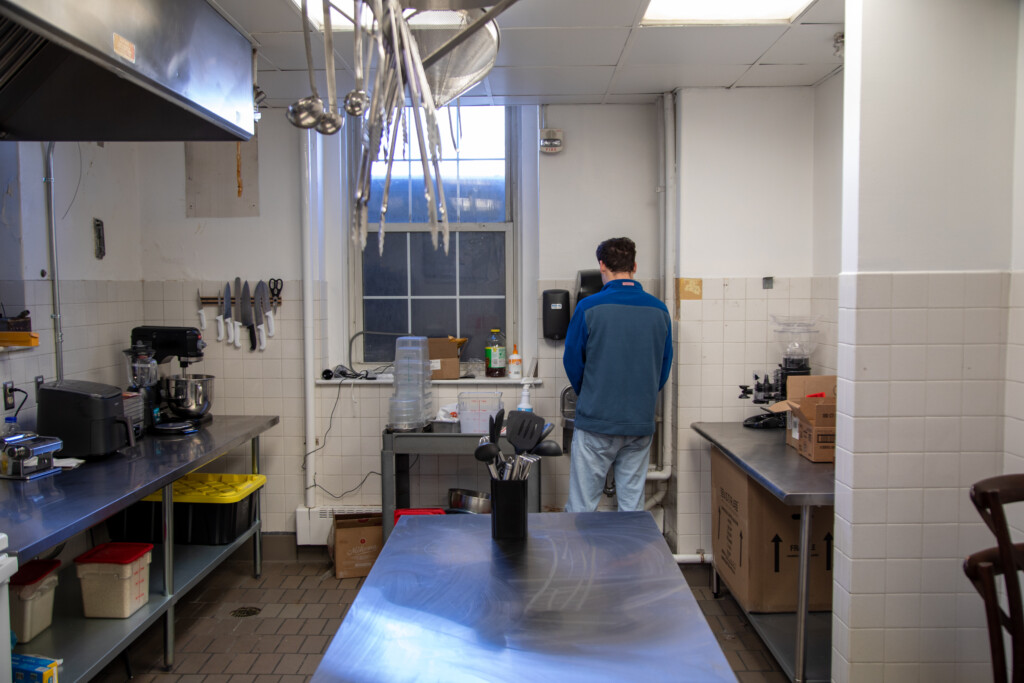The tale of the tragic Orpheus, the famous musician who descends into Hades to recover his deceased wife Eurydice, is one of the oldest great stories. Todd Theatre is now presenting the other side to the well-known story – Eurydice’s tale.
Our story begins, as any great story does, with happiness. In the case of “Eurydice,” it is a sheer, blissful, almost evil happiness. Orpheus and Eurydice entwine themselves in each other’s arms and hearts, talk of literature and music and finally, decide to wed.
So ends the happiness. Eurydice’s father, speaking from the Underworld, sends a letter to Eurydice on her wedding day – imagine a backwards sance – that is discovered by a slick youth. He lures Eurydice to his high-rise apartment on her wedding day, and after failing to put the moves on her, gives her the letter. Eurydice, uncomfortable, dashes off – only, in her haste, plunges to her death. After a waterlogged ride to Hades, she loses her memory, meaning she no longer recognizes her father, who greets her at the gate.
Here we meet the interesting characters – the father, the stones and, best of all, Hades. The stones – those who, in the Orpheus myth, were so moved by his music that they would actually cry – attempt to break Eurydice of the emotion she still possesses. Though she has forgotten Orpheus, her father attempts to remind her of he himself is, and of her life
The final player is the most delightful Hades, who rides around on a tricycle in a Nazi-reminiscent uniform, blaring – what else? – death metal. Hades attempts to seduce Eurydice, who will have none of it. Through the duration of this, we catch glimpses of Orpheus’s now miserable life, leading up to the point where he makes his descent. The story is beautiful, tragic and Shakespearean, before that was even an adjective.
Technically, Todd makes great use of its stage. “Eurydice” does not allow itself to be easily dated, set sometime in the late twentieth century (although if the older luggage is any proof, it is in the pre-Samsonite era). The stage itself is a tapestry of wood planks, rising up to make mini-stages for the players. In this, the stage suits both a sandy shoreline, a fancy ballroom, or even, with the proper lighting, the depths of Hell, and the actors utilize each part excellently.
Proper lighting, though, is harder to come by. Although there is plenty of strong dramatic lighting focused on the raised parts of the stage, it feels otherwise indiscriminate. The more dimly lit characters on the flat part of the stage receive only a soft glow.
When the lighting is right, though, the audience should be thankful – the costumes are well worth seeing. Eurydice’s clothes are pretty, yet simple. Orpheus’s clothes for most of the play, though, are unfortunately dull for what one imagines being in the wardrobe of such a musician.
The music in the show is fantastic, switching from sad to happy as fast as the passive-aggressive Eurydice. The only odd part of the musical scheme is that almost none of it comes from Orpheus himself, but from the stones. I’ll give you a minute to immerse yourself in the irony.
But even if the technical aspects are not all up to snuff, the strong acting and refreshing storyline are more than enough to entertain and move you for 75 minutes – even if you’re a stone.
“Eurydice,” directed by Sean Daniels, shows from Dec. 7-16 at 8 p.m. in Todd Union, with a 3 p.m. matinee on Dec. 10.
Brenneman is a member of the class of 2009.



